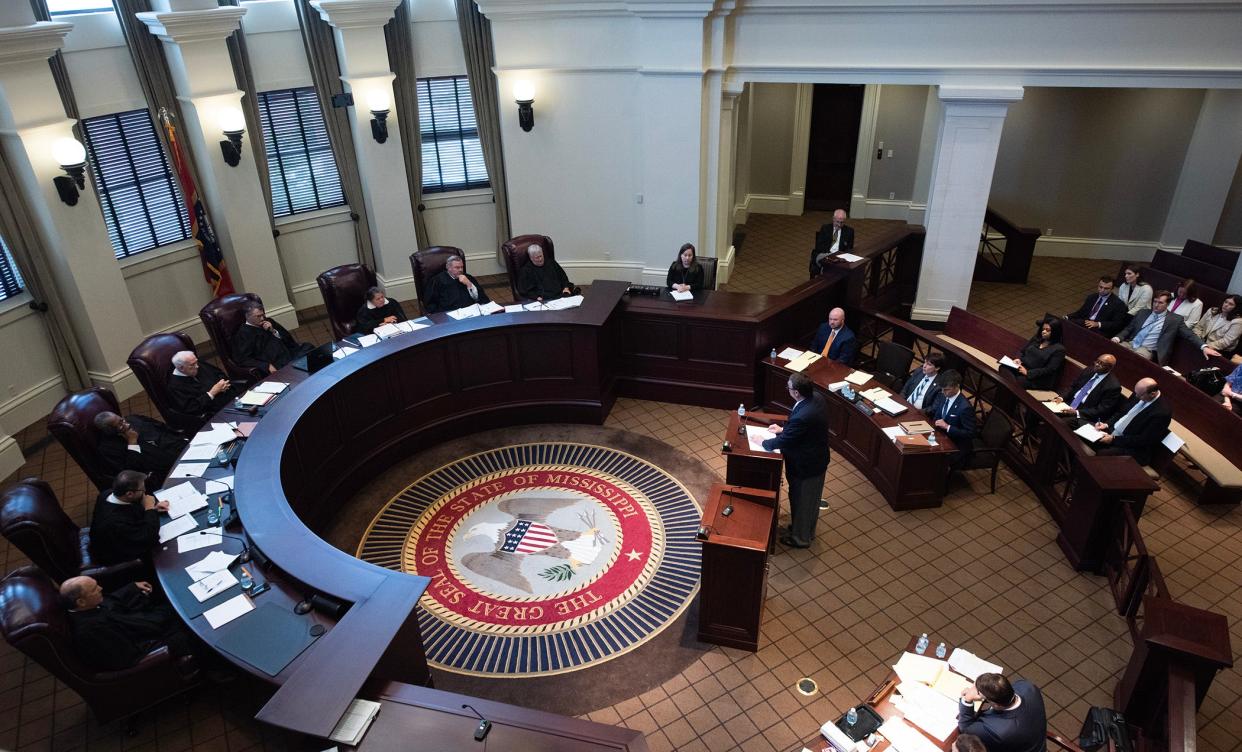Analysis: What will happen if the MS Supreme Court is split on a House Bill 1020 decision?

- Oops!Something went wrong.Please try again later.
The Mississippi Supreme Court is deliberating on whether to uphold or strike down one of the most controversial bills passed by the legislature in recent years, and Chief Justice Michael Randolph announcing his recusal leaves the distinct possibility of a tied 4-4 decision from the usually nine-member body.
For the team challenging House Bill 1020, a bill that would give the state government wider control over the legal system and police within Hinds County, the recusal does not change much. They will still need five justices on their side to strike the law down.
That is because, like with the U.S. Supreme Court, when a Mississippi Supreme Court or Court of Appeals ruling results in a tie, the lower court decision is upheld. In this case, Hinds County Chancery Judge Dewayne Thomas ruled in May in the state's favor.
It will likely never be known for sure how Randolph would have sided had he not recused himself from deciding on whether he has the power to appoint judges under the statute. The chief justice has refused to take a position on the bill's constitutionality. That said, he has defended the need for and effectiveness of judges he has previously appointed.
Randolph's absence leaves attorney Cliff Johnson and the three Hinds County residents he represents with an uphill climb. Johnson's team would need five of the eight remaining justices to buy his arguments in order for HB 1020 to be struck down. The state legal team, led by Solicitor General Scott Stewart, would only need four of them for it to be upheld.
The possibility of a tie may remind people of recent history in the U.S. Supreme Court. In 2016, after the death of Justice Antonin Scalia, his seat sat vacant for nearly a year, as Republicans in the Senate blocked Democratic President Barack Obama's nominee. A number of consequential decisions were decided, 4-4, in that span, reverting the outcomes to the lower courts.
Notable Mississippi draws
There is a history of tied appellate court decisions in Mississippi as well.
In the 10-judge Mississippi Court of Appeals, an error correction court that hears cases assigned by the state supreme court, ties are relatively common. In 2019, for example, the court tied, 4-4, on a case involving a schoolteacher who was fired after allegedly making racist posts to Facebook. The decision reverted to the lower court, and the teacher was reinstated and awarded backpay.
In the Mississippi Supreme Court, with its uneven number of judges, ties are rarer.
In 2015, the Court split, 4-4, in Sandoz v. Mississippi. The tie led to the lower court ruling — which found pharmaceutical company Sandoz liable for defrauding the state's Medicaid program — being upheld.
One of the most notable ties in Mississippi Supreme Court history came in the 1985 case Pearl River Valley Water Supply v. Hinds County. In that case, Hinds and Leake counties sought to limit how the board that oversees the Ross Barnett Reservoir and force the board to be more transparent with its accounting. The lower court put in place an injunction on the board's spending but denied the counties' push for a full accounting of spending. The supreme court ruled unanimously to strike down the injunction but split, 4-4, on the accounting issue. In the end, neither of the two counties' requests were granted.
While the state supreme court continues its deliberations, HB 1020 and an accompanying Senate Bill remain blocked under order by U.S. District Judge Henry Wingate as part of a separate federal challenge to the statutes.
This article originally appeared on Mississippi Clarion Ledger: History of Mississippi Supreme Court tie votes, and why it matters now

